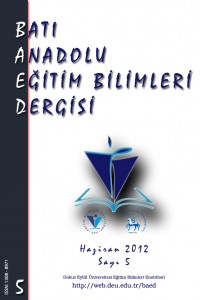Abstract
Bu araştırmada okul psikolojik danışmanlarının bilgi ve iletişim teknolojilerini (BİT) nasıl
kullandıkları araştırmacılar tarafından geliştirilen bir anket aracılığıyla ortaya konmaya çalışılmıştır.
Ulaşılan 208 katılımcının 132’i kadın, 76’i erkek; yaş ortalamaları 30.8’dir. Katılımcıların 161’i ilk ve
orta öğretim okullarında, 47’si Rehberlik Araştırma Merkezinde çalışmaktadır. Verilerin analizinde
kay kare, tek yönlü varyans analizi ve t testi kullanılmıştır. Psikolojik danışmanların çoğunun
kurumlarında tüm BİT’nin olduğu, yaklaşık dörtte üçünün BİT ile ilgili ders aldıkları ancak üçte
birinden azının BİT’nin PDR’de nasıl kullanabileceğine ilişkin bilgisi olduğu bulunmuştur. Elde edilen
bulgulara göre psikolojik danışmanların çoğu BİT’nin temelinde yer alan bilgisayarı en fazla rapor
yazmak, sunu hazırlamak, eposta aracılığı ile haberleşmek, web sayfası araştırmak amacıyla, en az
velilerle bağ kurmak amacıyla kullanmaktadırlar. Yapılan kay kare testi sonucunda cinsiyet, yaş ve
çalışılan eğitim kurumuna göre psikolojik danışmanlar arasında, son değişken hariç, bazı anlamlı
farklar bulunmuştur. Sonuçlara göre genç psikolojik danışmanlar BİT’ni mesleki rehberlik ve web
taraması için, erkek psikolojik danışmanlar test verme ve eğitimler için daha fazla kullanmaktadırlar.
Ayrıca, psikolojik danışmanların BİT’ni kullanmada kendilerini rahat ve yeterli hissettikleri ve BİT’ni
kullanmanın üretkenliklerini artırdığı biçiminde algıladıkları sonucu elde edilmişse de yapılan
karşılaştırma testlerii sonucunda bu konuda cinsiyet, yaş ve çalışılan eğitim kurumuna göre anlamlı
bir fark olmadığı sonucuna ulaşılmıştır.
A Pilot Study on Information and Communication Technologies Utilization Among Turkish School Counselors
Abstract
This study sought to investigate information and communication technologies (ICT) usage among Turkish school counselors utilizing a questionnaire developed by the authors. The participants were 208 school counselors (132 female, 76 male) with a mean age of 30.8 years. This sample contained 161 counselors employed in public elementary and secondary schools while the remaining 47 were employed in Guidance Resource Centers. The survey results were tabulated and examined for significant differences utilizing Chi-Square, t-test and one-way analysis of variance. Results of this survey revealed that virtually all participants had access to ICT at their worksite. Although 75% of the participants reported formal training in ICT only one third reported specific training in applying this knowledge in the field of Counseling. From among the applications of ICT to counseling, as identified by the Association for Counselor Education and Supervision and the Council for Accreditation of Counseling and Related Educational Programs, the most frequently identified were report writing, presentation preparation, emailing, and internet searches. The least frequently reported uses were for data base utilization and communication with parents. Chi-Square analysis revealed that younger counselors (<30 years of age) tend to use ICT for career counseling and web-site searches more frequently than older colleagues. This analysis further revealed that male counselors use ICT for testing/assessment purposes and for professional development more frequently than their female counterparts. The results revealed that although the participants reported high levels of self-reported competence, confidence or productivity related to ICT use, there were no significant differences by gender, age, or work setting.
Details
| Primary Language | Turkish |
|---|---|
| Journal Section | Articles |
| Authors | |
| Publication Date | February 1, 2012 |
| Submission Date | August 6, 2014 |
| Published in Issue | Year 2012 Volume: 3 Issue: 5 |


